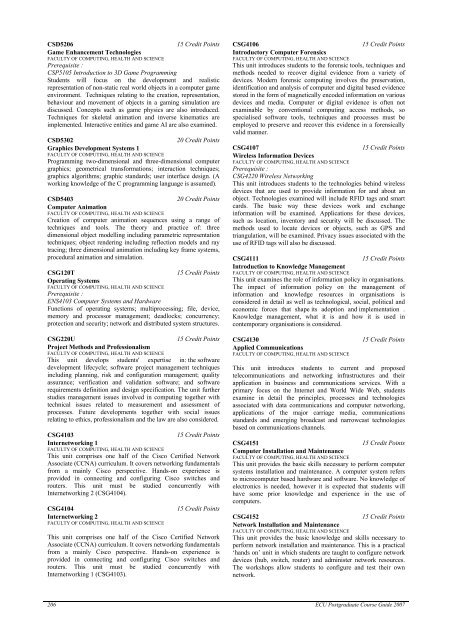Course Guide - Edith Cowan University
Course Guide - Edith Cowan University
Course Guide - Edith Cowan University
You also want an ePaper? Increase the reach of your titles
YUMPU automatically turns print PDFs into web optimized ePapers that Google loves.
CSD5206<br />
15 Credit Points<br />
Game Enhancement Technologies<br />
FACULTY OF COMPUTING, HEALTH AND SCIENCE<br />
Prerequisite :<br />
CSP5105 Introduction to 3D Game Programming<br />
Students will focus on the development and realistic<br />
representation of non-static real world objects in a computer game<br />
environment. Techniques relating to the creation, representation,<br />
behaviour and movement of objects in a gaming simulation are<br />
discussed. Concepts such as game physics are also introduced.<br />
Techniques for skeletal animation and inverse kinematics are<br />
implemented. Interactive entities and game AI are also examined.<br />
CSD5302<br />
20 Credit Points<br />
Graphics Development Systems 1<br />
FACULTY OF COMPUTING, HEALTH AND SCIENCE<br />
Programming two-dimensional and three-dimensional computer<br />
graphics; geometrical transformations; interaction techniques;<br />
graphics algorithms; graphic standards; user interface design. (A<br />
working knowledge of the C programming language is assumed).<br />
CSD5403<br />
20 Credit Points<br />
Computer Animation<br />
FACULTY OF COMPUTING, HEALTH AND SCIENCE<br />
Creation of computer animation sequences using a range of<br />
techniques and tools. The theory and practice of: three<br />
dimensional object modelling including parametric representation<br />
techniques; object rendering including reflection models and ray<br />
tracing; three dimensional animation including key frame systems,<br />
procedural animation and simulation.<br />
CSG120T<br />
15 Credit Points<br />
Operating Systems<br />
FACULTY OF COMPUTING, HEALTH AND SCIENCE<br />
Prerequisite :<br />
ENS4103 Computer Systems and Hardware<br />
Functions of operating systems; multiprocessing; file, device,<br />
memory and processor management; deadlocks; concurrency;<br />
protection and security; network and distributed system structures.<br />
CSG220U<br />
15 Credit Points<br />
Project Methods and Professionalism<br />
FACULTY OF COMPUTING, HEALTH AND SCIENCE<br />
This unit develops students' expertise in: the software<br />
development lifecycle; software project management techniques<br />
including planning, risk and configuration management; quality<br />
assurance; verification and validation software; and software<br />
requirements definition and design specification. The unit further<br />
studies management issues involved in computing together with<br />
technical issues related to measurement and assessment of<br />
processes. Future developments together with social issues<br />
relating to ethics, professionalism and the law are also considered.<br />
CSG4103<br />
15 Credit Points<br />
Internetworking 1<br />
FACULTY OF COMPUTING, HEALTH AND SCIENCE<br />
This unit comprises one half of the Cisco Certified Network<br />
Associate (CCNA) curriculum. It covers networking fundamentals<br />
from a mainly Cisco perspective. Hands-on experience is<br />
provided in connecting and configuring Cisco switches and<br />
routers. This unit must be studied concurrently with<br />
Internetworking 2 (CSG4104).<br />
CSG4104<br />
Internetworking 2<br />
FACULTY OF COMPUTING, HEALTH AND SCIENCE<br />
15 Credit Points<br />
This unit comprises one half of the Cisco Certified Network<br />
Associate (CCNA) curriculum. It covers networking fundamentals<br />
from a mainly Cisco perspective. Hands-on experience is<br />
provided in connecting and configuring Cisco switches and<br />
routers. This unit must be studied concurrently with<br />
Internetworking 1 (CSG4103).<br />
CSG4106<br />
15 Credit Points<br />
Introductory Computer Forensics<br />
FACULTY OF COMPUTING, HEALTH AND SCIENCE<br />
This unit introduces students to the forensic tools, techniques and<br />
methods needed to recover digital evidence from a variety of<br />
devices. Modern forensic computing involves the preservation,<br />
identification and analysis of computer and digital based evidence<br />
stored in the form of magnetically encoded information on various<br />
devices and media. Computer or digital evidence is often not<br />
examinable by conventional computing access methods, so<br />
specialised software tools, techniques and processes must be<br />
employed to preserve and recover this evidence in a forensically<br />
valid manner.<br />
CSG4107<br />
15 Credit Points<br />
Wireless Information Devices<br />
FACULTY OF COMPUTING, HEALTH AND SCIENCE<br />
Prerequisite :<br />
CSG4220 Wireless Networking<br />
This unit introduces students to the technologies behind wireless<br />
devices that are used to provide information for and about an<br />
object. Technologies examined will include RFID tags and smart<br />
cards. The basic way these devices work and exchange<br />
information will be examined. Applications for these devices,<br />
such as location, inventory and security will be discussed. The<br />
methods used to locate devices or objects, such as GPS and<br />
triangulation, will be examined. Privacy issues associated with the<br />
use of RFID tags will also be discussed.<br />
CSG4111<br />
15 Credit Points<br />
Introduction to Knowledge Management<br />
FACULTY OF COMPUTING, HEALTH AND SCIENCE<br />
This unit examines the role of information policy in organisations.<br />
The impact of information policy on the management of<br />
information and knowledge resources in organisations is<br />
considered in detail as well as technological, social, political and<br />
economic forces that shape its adoption and implementation .<br />
Knowledge management, what it is and how it is used in<br />
contemporary organisations is considered.<br />
CSG4130<br />
Applied Communications<br />
FACULTY OF COMPUTING, HEALTH AND SCIENCE<br />
15 Credit Points<br />
This unit introduces students to current and proposed<br />
telecommunications and networking infrastructures and their<br />
application in business and communications services. With a<br />
primary focus on the Internet and World Wide Web, students<br />
examine in detail the principles, processes and technologies<br />
associated with data communications and computer networking,<br />
applications of the major carriage media, communications<br />
standards and emerging broadcast and narrowcast technologies<br />
based on communications channels.<br />
CSG4151<br />
15 Credit Points<br />
Computer Installation and Maintenance<br />
FACULTY OF COMPUTING, HEALTH AND SCIENCE<br />
This unit provides the basic skills necessary to perform computer<br />
systems installation and maintenance. A computer system refers<br />
to microcomputer based hardware and software. No knowledge of<br />
electronics is needed, however it is expected that students will<br />
have some prior knowledge and experience in the use of<br />
computers.<br />
CSG4152<br />
15 Credit Points<br />
Network Installation and Maintenance<br />
FACULTY OF COMPUTING, HEALTH AND SCIENCE<br />
This unit provides the basic knowledge and skills necessary to<br />
perform network installation and maintenance. This is a practical<br />
‘hands on’ unit in which students are taught to configure network<br />
devices (hub, switch, router) and administer network resources.<br />
The workshops allow students to configure and test their own<br />
network.<br />
206 ECU Postgraduate <strong>Course</strong> <strong>Guide</strong> 2007



